So what did I think of it? Well, I liked it. Quite a bit, really. The problem is, I can't entirely explain why. It was well-written, sure, but the prose was fairly straightforward. I was abruptly awed by a beautiful passage every now and then, but I didn't go through a whole stack of Post-it flags marveling over every page, the way I did with Tolstoy Lied. And the plot was compelling, but not in an "I can't possibly put this book down now; I simply must read the next chapter before I go to sleep!" sort of way. So mainly, I suppose it was just a good story, a clever premise, with a sweet love story and a sufficient number of vivid images woven within. In all, it was a lovely book.
If you aren't familiar with this one, here's a brief synopsis. (I promise I won't give away anything that you won't also read on the book jacket or in the first pages of the first chapter.) The narrative alternates between Henry and Clare, who met when Clare was a child and Henry was a 40-something-year-old man. The two are actually only eight years apart in age, but Henry has a genetic defect that makes him spontaneously time-travel, so they meet over and over at various ages and times, often out of sync but always linked to each other in some way.
I am still trying to wrap my head around Niffenegger's approach to time travel, which I suppose is what kept the book interesting. I am probably not alone in saying that my understanding of time travel is culled almost entirely from Back to the Future, and with Marty and Doc Brown as my only reference points, a lot of how this story unfolded made no sense. Henry maintains that he can't affect the future in any way during his time travels, because everything has already been decided. His friend with HIV can't go back and "kill the fucker" who gave him the virus, because he didn't kill him back then. I read that, and all I could think of was Michael J. Fox's hand disappearing while he was playing guitar because he had affected the past in a way that made him not exist in the future. Audrey Niffenegger, didn't you learn anything from Marty McFly?? Sheesh.
Because of this logic (or missing logic), I couldn't make sense of the love story. (Again, I promise I'm not spoiling anything here; all of what I'm about to write plays out very early in the book.) Henry thinks nothing he does in his time travels can affect the future (or the past) from whence he came, but if that were true, the love story never would have taken place. When Clare sees Henry in the opening chapter (she is 20; he is 28), she throws her arms around him as a long-lost friend who she's been told since childhood she's going to marry. He, on the other hand, has no idea who she is. The first time Clare met him, he was in his 40s, so he has no memory of her yet. So, if he hadn't met her in the past, she wouldn't know him in the future. She wouldn't have nearly accosted him in the library, and they wouldn't have begun their romance. It's baffling; I can't get out of the circular logic of it. So quite obviously I need to let it go.
Instead, then, let's focus on some of those lovely passages I mentioned, shall we? Like I said, I didn't flag a whole lot while I read this one, but here are a few parts that struck me nonetheless.
[Clare]: I have never been in the Newberry Library before, and now that I've gotten past the dark, foreboding entrance, I am excited. I have a sort of Christmas-morning sense of the library as a big box full of beautiful books.
[Henry]: Mom had just gotten back from Sydney, and she had brought me an immense, surpassingly blue butterfly... I would hold it close to my face, so close I couldn't see anything but that blue. It would fill me with a feeling, a feeling I later tried to duplicate with alcohol and finally found again with Clare, a feeling of unity, oblivion, mindlessness in the best sense of the word.
[Clare]: I wake up in my bed, the bed of my childhood. As I float on the surface of waking I can't find myself in time; is it Christmas, Thanksgiving? Is it third grade again? Am I sick? Why is it raining?
[Clare]: I am having a hard time, in my tiny back bedroom studio, in the beginning of my married life. The space that I can call mine, that isn't full of Henry, is so small that my ideas have become small. I am like a caterpillar in a cocoon of paper; all around me are sketches for sculptures, small drawings that seem like moths fluttering against the windows, beating their wings to escape from this tiny space.
[Henry]: A nurse calls our names. We repair to an examining room. Clare gets undressed, and gets on the table, and is greased and scanned. The technician watches the monitor. Amit Montague, who is tall and regal and French Moroccan, watches the monitor. Clare and I hold hands. We watch the monitor, too. Slowly the image builds itself, bit by bit.
On the screen is a weather map of the world. Or a galaxy, a swirl of stars. Or a baby.
"Bine joue, une fille," Dr. Montague says. "She is sucking her thumb. She is very pretty. And very big."
Clare and I exhale. On the screen a pretty galaxy is sucking her thumb. As we watch she takes her hand away from her mouth. Dr. Montague says, "She smiles." And so do we.
When I was adding The Time Traveler's Wife to my list of Books I've Read This Year, I noticed that I never wrote anything about Prep, despite noting at least three times that I was going to do so. I guess that's why I still have it sitting in a pile of CDs and books and paperwork on my desk. Sometimes my cluttered disorganization has a purpose after all. Huh.
So. My flags are still in the book, and I can still try to call up what I liked or didn't like about it. My only problem with Prep, I think, was the timing with which I read it. When I started it, I was trying to hold on to the high of confidence and the strive toward self-actualization brought on by Eat Pray Love. The last thing I needed right then was to be reminded of the awkwardness and insecurity of high school. I wanted Lee to get over herself and just cheer up or at least speak her mind for once, but I likely wouldn't have felt that way had I read it just a few months earlier.
Was Prep an overall incredible and must-read book? No. Probably not. But I did marvel at Sittenfeld's keen, seemingly effortless memory of the small details of youth, of the same thoughts and experiences I have from high school and early college but which I've long since let slip from daily thoughts. Parts like these...
Classes ended that Friday, and ... in the dorms, some people had already started packing, which I hated doing--I saw the naked walls and cleared-away surfaces as unkind reminders of just how fleeting it all was, just how illusive the idea that any of it belonged to us.
I pursed my lips toward him; we were kissing. It was harder work than I had imagined, and less immediately pleasing. In fact, it felt intriguing more than enjoyable--the shifting, overlapping wet and dry parts of our mouths and faces, the mild sourness of his mouth (it seemed so personal to be tasting Cross's mouth), and also the way it was hard not to be conscious of the moment as it happened, not to want to pause and acknowledge it, even if only by laughing. I didn't find kissing funny, but it didn't seem that serious, either, not as serious as we were acting like it was.
Two days later, I picked up my first packet of birth control pills from the infirmary, which made me feel so unlike myself that I would not have been surprised, when I looked in the mirror, to see a forty-year-old divorced mother of two, a cowgirl, an aerobics instructor on a cruise ship in the Caribbean.
...and also parts where Sittenfeld looks between youth and adulthood and compares what she's learned with startlingly accurate observations...
To play a great game of high school basketball--it was something I myself had never done, but I could tell--made you know what it was to be alive. How much in an adult life can compare to that? Granted, there are margaritas, or there's no homework, but there are also puffy white bagels under neon lights in the conference room, there's waiting for the plumber, making small talk with your boring neighbor.
There was plenty I learned from Dave. Later... I even saw Dave as practice for Cross, as preparation. He made me ready, as Conchita had made me ready for a friendship with Martha; there are people we treat wrong and later, we're prepared to treat other people right. Perhaps this sounds mercenary, but I feel grateful for these trial relationships, and I would like to think it all evens out--surely, unknowingly, I have served as practice for other people.
I wanted to be touching Cross and now I was; I could feel the rise and fall of his chest. And we matched each other well, our bodies fit. I didn't know enough then to realize that doesn't always happen--that sometimes you cannot settle on an angle with the other person, your weight won't balance, your bones poke.
And then there were the passages I just found funny, or true-to-experience, or simply notably original descriptions of the average and everyday. Here are just a few...
My self-consciousness... was something I'd anticipated, something I had to live with but could not acknowledge--a bride descending the aisle with an itchy nose.
I could hardly talk to my classmates, and I definitely couldn't dance. I had tried once at a cousin's wedding and I had not been able to stop thinking, "Is this the part where I throw my arms in the air?"
It wasn't that I suspected Mrs. Morino of lying, more that it seemed so hard to believe anything ever happened, or was happening. The big occurrences in life, the serious ones, have for me always been nearly impossible to recognize because they never feel big or serious. In the moment, you have to pee, or your arm itches, or what people are saying strikes you as melodramatic or sentimental, and it's hard not to smirk. You have a sense of what this type of situation should be like--for one thing, all-consuming--and this isn't it. But then you look back, and it was that; it did happen.
The wrongness of what had happened... I could feel it now. Not a moral wrongness, but a screwup, a thing that needed explanation: a bird in the grocery store, a toilet that won't stop running, that moment when your friend has come to pick you up and you open the door and realize it's not your friend's car at all; the person driving is a stranger, and now you must apologize.
I was wholly unafraid of getting caught; I have always believed that extreme circumstances protect you from ordinary dangers, and while I recognize my belief as illogical, I have not yet been proven wrong.
Our relationship... was about the irrelevance of words. You feel what you feel, you act as you act; who in the history of the world has ever been convinced by a well-reasoned argument?
So. That's two thumbs mostly up for The Time Traveler's Wife and Prep, belated though those thumbs-up may be. And although my "to get at the library someday" list is long (as is the stack of books-not-yet-opened on my own bookshelf), I'm still uncertain just what to read next. Tell me, what have you loved or not loved lately? I'd love to hear what's on your lists.

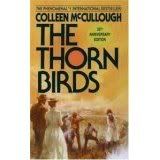
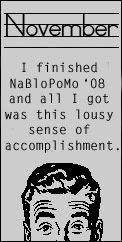

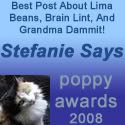

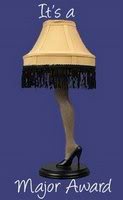
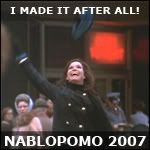



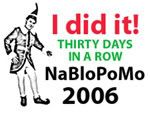

8 comments:
I love that basketball quote. I must not have marked it when I read it, but, man, that is some good shit.
The latest book I've enjoyed is "The Dogs of Babel." It's fast and interesting and even a little eerie.
Ah...time travel. I find the whole concept both incredibly fascinating and terribly confusing. There's ALWAYS a conundrum. I can't tell you how much time I've wasted trying to figure out the origin of the watch in "Somewhere in Time." You know...at the beginning of the movie, she, as an old lady, gives it to him, and then goes off and dies. Several years later he travels back in time and leaves it with her, now a young lady, then HE goes off and dies. Neither of them bought the watch, neither of them died in possession of the watch, so where did it come from? And where did it go? AAAAAARRRRGGGHHH!
Are you a Christopher Moore fan? If not, you should immediately acquaint yourself with his sick and twisted (in the best way) and hilariously funny novels.
It's hard to do, but as soon as I let go of the logic problems, The Time Traveler's wife became so much more enjoyable. Like Liz, though, my problem was when he went to his childhood and taught himself to pick a lock. But if he taught himself, who ever taught him?
The bottom line is that if an author comes up with the rules for his or her universe and sticks to them, you can get past all the logistical problems with consistency. It's also why I like vampire novels.
As for a different kind of time travel book (don't worry, not the going back in time kind,) I highly recommend "Cloud Atlas" by David Mitchell. Each chapter is a different story in a different time and written in a different way, but they all link together beautifully.
I also rely on Marty McFly (and Doc!) for all my knowledge of time travel.
I really liked the book Ice Chorus, which is written by a Minnesota author whose last name starts with S, but I am too lazy to look it up.
I read Prep a good while ago, and do remember quite liking it.
Haven't read The Time Travelers Wife, but might look out for it, sounds like an interesting concept.
I don't have anything on my list at present which is horrifying to me - I have actually run out of books at the moment. Luckily I have plenty I don't mind re-reading.
I have three - no, four - no, five - to recommend.
(1) A Thousand Splendid Suns, by Khaled Hosseini. Freakin' fantastic.
(2) Water for Elephants, by Sara Gruen. I'm mid-read and loving it.
(3) The Good Life, by Jay McInerney. Also mid-read and loving.
(4) The Last of the Savages, by Jay McInerney. (While we're talking McInerney, I may as well recommend this. One of my all-time faves.)
(5) The Secret History, by Donna Tartt. (While we're talking all-time faves...)
xo
Malia--If your past recommendations are any indication, our tastes are fairly similar, so I will add it to the list! Thanks.
Liz--I think I saw that movie only once, years ago, but I remember being bothered by the same thing!! Gah; it's maddening (but fascinating). And I know I have Christopher Moore on my "read someday" list, but I've never read any of his stuff yet. I think it's "Lamb: The Gospel According to Biff, Christ's Childhood Pal" that I have on my library list. Would you recommend that one, or some other title first?
Noelle--Somehow, I didn't even think about the lock-picking part! Good point, though! Also, I know "Cloud Atlas" is on my library list (though I had almost forgotten about it). I think David Sedaris mentioned it at a reading once when someone asked him what he'd read lately and enjoyed.
R--Who knew Marty and Doc were so influential, right? :-)
OtherBear--You have RUN OUT of books??? Wow; what's THAT like? ;-) (I have so very many on my shelf that I probably never should have bought, since I obviously didn't want to read them too quickly... or in some cases, ever!)
GG--At least three of those are on my list already (probably because you recommended them). ;-) I have never read Jay McInerney, but that name keeps coming up from time to time. Guess I should familiarize myself.
Whew! I'm glad you at least sort of liked The Time Traveler's Wife. :) Also, I second GG's recommendation for A Thousand Splendid Suns...I think you'll love it.
Post a Comment